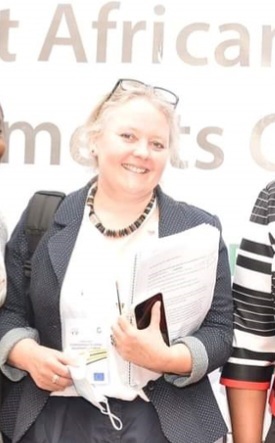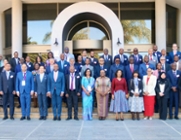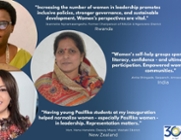Creating CLGF's new strategic plan

04 May 2022
Speaking at the Southern Africa Regional Conference held in Johannesburg this week, CLGF Secretary-General Ms Lucy Slack described the organisation’s work to create a new strategic plan, post-COVID, confirming the importance of people and partnerships throughout.
With the creation of CLGF’s new strategic plan, post-Covid, events like this conference in the Southern Africa region provided a good opportunity to listen to CLGF members and incorporate their views and proposals.
Rapid urbanisation
Setting the context, Lucy explained that, by 2050, it was forecast that 50% of the population would be living in cities, some of which have still to be built. This includes many people who live and work in informality. As a sector, local government is now acutely aware of the need to learn from each other about how to support this significant and vulnerable sector. She explained that, going forward, it was critical to plan and build great cities, but based on the realities of what we find.
Youth innovation
Add to this that 65% of the targets of the Sustainable Development Goals (SDGs) have an urban connection, the importance of cities is further confirmed. Consideration must clearly be given to the fact that 60% of the Commonwealth’s population is under 30 and involving and integrate the views of this demographic is vital. Much work has gone into developing a Call to Action for Sustainable Development by CLGF and other Commonwealth partners.
Local government at heart of climate action
The climate crisis is a major issue and Ms Slack said it was good to hear about the Global Covenant of Mayors initiatives, which put local government at the heart of strategies to address this.
The global pandemic has resulted in job losses, shrinking economies, loss of livelihoods - with women, the poor and marginalised being hit particulary hard - and this all served to entrench the existing inequalities. But Ms Slack told the audience in Johannesburg that it was important to draw from the positive response that local government in so many countries has made: being on the frontline of the response, continuing to deliver key services with limited resources, and working with national government to deliver additional services to protect people from the significant risks of the pandemic.
Local government making a difference
The pandemic, while creating a huge challenge, has also shown us what local government, linked up and integrated with other levels of government and civil society, can do to make a difference, and this is continuing in the post-COVID period. "For us," she said, "our priorities remain clear and it is crucial to create peaceful, resilient communities, with a clear mandate to keep people at the heart of development and, to do this, local government needs the powers and the resources, including financial."
LED for economic growth
Shrinking economies make investment in local government difficult, but LED has been shown as an important tool to create economic growth. If we bring all the relevant partners together to understand the local economies - the stakeholders, partners and circumstances, we can put together strategies and look to implement and take action by investing in programmes that contribute to building the economy locally.
She expressed her pride in the capacity building work with CLGF members on LED, and the ability to work in partnership to develop strategies and put together business plans, letting communities feed in, but also recognise and benefit from the results. This way, they could see the whole cycle of LED and the value of contributing locally. "This is more than a project, it is a process" she said. Being able to own land, the leadership of mayors and councillors in communicating LED and creating an enabling environment: this is all crucial to providing an environment where commerce can thrive.
Gender parity in decision making
The other key priority in CLGF's strategic plan relates to gender and ensuring we do not take our foot off the pedal in promoting the empowerment of women.
She explained that, as an organisation, CLGF is in the process of developing a new strategic plan for the next five years and "our vision is to provide a mechanism to improve lives and support developmental local government. Locating local government in national frameworks and making it an intrinsic part of democracy and development. The Commonwealth is all about people; local government is all about people; and it's crucial to put people at the centre of all we do."
Local government and health
Health is more commonly associated with clinics and medics, but local government plays a vital role in the health of our communities through services such as water, waste management, sanitation and market hygiene, which make a big difference to the health of our citizens.
In our role as a Commonwealth organisation, CLGF meets with the highest level of decision-makers every two years at the Commonwealth Heads of Government Meeting (CHOGM). At the next meeting in Rwanda, in June, it is CLGF's opportunity to convey local government's message and this will include delivering two high-level, side events on sustainable urbanisation and women's empowerment, naturally working in partnership.
She concluded by emphasising the important role of CLGF as a convenor, a champion, bringing together local government stakeholders to learn lessons and share experience and ideas, just like they are at the Southern Africa Regional Meeting, and then making this intelligence or information available to all our members across the Commonwealth. Describing the content of the new strategic plan as a broad basket on which CLGF is focusing, look out for more information about the new Strategic Plan as the process continues.
Back to News





